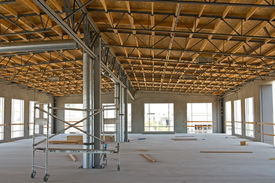Own or rent? There’s no single answer because no two HVAC sheet metal shops are identical. The best approach to finding a solution? As you continue on your HVAC career, leave no stone unturned, and continue to re-assess your situation as the years roll by. After all, decisions like this extend beyond just business, impacting you’re your happiness and health.
Let’s set the scene with two big considerations:
- Business Type – Which of these business structures, did you select?

- Sole proprietorship
- Partnership
- Corporation
- Business Future – What are your ambitions?
- Are you planning to build and expand your business over the next few decades?
- Maintain your business momentum?
- Slow down your business, or prepare it for sale?
Answering these questions will not only allow you to plan your operation finances, but help a lot in making the decision to own or rent. Let’s break down the business types first and discuss their differences.
Business Type
Sole Proprietorship – The simplest and most common form of business.
Pros:
- Easier and less expensive formation of the business
- 100% controlled by the single proprietor who collects all profits
Cons:
- Unlimited liability
- Limited sources of financing
- Limited lifespan. The business ends when the owner dies.
Partnership – A business operated by two or more people. You’ll typically see two types of partnership: general partnerships where all partners have unlimited liability, and a limited partnership where at least one partner has full liability and one has limited liability that is restricted to the individual’s investment.
Pros:
- Organizational simplicity
- Benefits from the combined skills and experience of each partner
Cons:
- Friction between partners due to differences in style, vision or some other aspect
Private Corporation. A business formed under U.S. state law requiring a legal document called “Articles of Incorporation.” Choices include a Limited Liability Company (LLC), a C corporation and an S corporation. Each has different tax and ownership features.
Pros:
- Well-suited for small groups of people
- Limited liability
- Unlimited lifespan
Cons:
- Following long-established “corporate formalities”
- Incorporation can be costly and time-consuming
With the options laid out in front of you, it’s time to consider – well, time. Let’s look at some ways your future business plans can impact your facility decisions.
Business Future
One of the most important factors in deciding where your business is heading is retirement. If you are not close to retirement, renting will likely offer you more flexibility if you need to move into larger space due to business growth. On the other hand,, if your rental space is already big enough to handle expansion for the next 10 years or so, buying your current premises is likely a good alternative. Of course, that’s assuming the property prices and interest rates don’t jump too high from the time of this posting.
Say you do have retirement on the horizon, though. Choosing between workshop rental and ownership is particularly concerning to many small- and medium-sized sheet metal shop owners who don’t have much in the way of a pension plan or retirement savings.
If that’s the case, the market is unlikely to be forgiving, regardless of rates, and it’s best to stick to your own property and not buy at a new location. Both time and cost could unravel your plans. You’d need to dedicate time to finding a new site, set aside funds for dismantling and/or transporting equipment, then set everything up anew. On top of it all, you’d be facing a loss from your time away from production.
Aside from those risks, however, there should be no handicap to investing in your own building — assuming you can reach an agreement to buy the shop you want — steadily paying off the mortgage so that it is free and clear on retirement can be a great way to end up with a nice pension, too.
Decision Point
As you turn over the stones, and come close to making up your mind, it’s important to make sure you have the right answer. Sometimes, this is when outside input from industry experts can help the most. Roto-Die has guided many sheet metal fabricators on starting and changing their businesses, providing equipment for new locations and expanding ones. We’re not really allowed to give legal advice, so you’ll still need a lawyer to sort out the specifics, but come to us with questions about setting up your workshop for success. We probably won’t co-sign on a new property with you, but we will help get you up and running.
Click here to go to our contact page so you can ask about fabrication equipment and more for your sheet metal operation.

